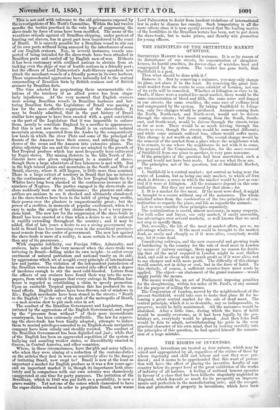THE PRINCIPLES OF THE SMITHFIELD MARKET QUESTION.
SACITIIFIELD Manx= is a manifold nuisance. It is so by reason of its disturbance of our streets, its concentration of slaughter- houses, its horrid cruelties, its drover-class of wretches bred and congregated by the system. The verdict has gone forth, that Smithfield is a pest.
Then what should be done with it ?
Remove it. But by removing a nuisance, younuiy, only change its place, not abate it in the least. By removing the great live- meat market from the centre to some outskirt of London not one of its evils will be remedied. Whether at Islington or dose to St. Paul's, if there were a central live-meat market, there would be the same concentration of blood and filth, the same noise and danger in our streets, the same cruelties, the same race of ruffians bred and congregated by the system. By taking Smithfield to Isling- ton, only two changes would be produced. Animals coming from the North, North-east, and North-west, would not be driven through the streets ; but those coming from the South, South- east, and South-west, would be driven through the streets twice as far as now. There would be as much driving through the streets as ever, though the streets would be somewhat different; and while some animals suffered less, others would suffer more. This change is not worth an effort. The second change would be the removal of the market from a place where the neighbours wish it to remain, to one where the neighbours do not wish it to come. The proposal of the Commission, therefore, for the mere -removal of Smithfield from one place to another, is very pure nonsense. If the principles of the question had been ascertained, such a proposal would not have been made. Let us see what these are.
The principles, not of the question, but of Smithfield Market, are two.
1. Smithfield is a central market; not centnal as being near the centre of London, but as being one only market, to which all live stock is driven ; a sense in which the market would be just as cen- tral if it were at Islington. All the nuisances depend on this cen- tralization. But they are not caused by that alone ; for
2. It is a market for live meat. If the meat were dead, it might be brought to a centre without any of the nuisances. The whole mischief arises from the combination of the two principles of oen- tralization as regards the place, and life as regards, the animals.
Let us now consider these principles separately.
The centralization is use almost necessary, in many respects. For both seller and buyer, one only market, if easily aoriessible, has advantages over several markets, so well known that we need. not stop to specify them. But. secondly, the life of the meat at market offers, per Sc, no advantage whatever. If the meat could be brought to the market dead, as easily and cheaply as if it were alive, everybody would say, let it come dead. Considering railways, and the now successful and growing trade of butchering in the country for the sale of dead meat in London by means of railway carriage, there appears no reason for doubt- ing that all the meat required in London might be sent thither dead, and sold as cheap with as much profit as if it were alive, not to say cheaper and with more profit. The difficulty of this change would consist, not in delay or cost, but in the force of habit. o this obstacle, of course, a sufficient counter-force must needs be applied. The object—an abatement of the grand nuisance—would amply justify the means.
The means would be, an act of Parliament imposing penalties for the slaughtering, within ten miles of St. Paul's, of any animal for the purpose of selling the carcass.
The Corporation of London, moved by the neighbourhood of the present Smithfield, would take care to make that place fit for be- coming a great central market for the sale of dead meat. The central principle, which it is so desirable, nay, so indispensable, to preserve, would be fully maintained. All the nuisances would be abolished. After a little time, during which the force of habit would be morally overcome, as it had been legally by the pro- hibitory act, everybody would be pleased. And then John Bull would be fain to admit, notwithstanding his pride in the very practical character of his own mind, that by looking carefully into the principles of this question, he had spared himself the commis- sion of a huge mistake.


























 Previous page
Previous page